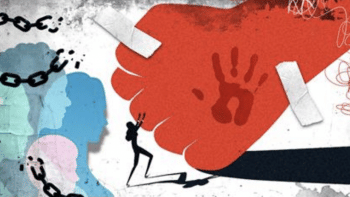Violence against women is a denial of human rights

Today is November 25—International Day for the Elimination of Violence against Women. Violence against women (VAW) ranges from wife abuse to rape, dowry killings, acid throwing, sexual harassment, genital mutilation, 'honour killing' and sexual slavery through international trafficking of women. It includes physical, sexual and emotional torture as well as financial abuse by even family members. Violence against women has numerous causes, including but not limited to patriarchal dominance, lack of gender sensitivity and corruption in the judicial system. In addition, low socio-economic status and childhood experience of abuse are a few determinants of VAW. Globally, in different cultures, socio-cultural norms deepen the subjugation of women, societies press women to tolerate abuse to protect "family honour." This contributes to normalisation of domestic violence.
VAW is an international issue that cuts across boundaries of age, status, education and geography. Estimates by the World Health Organisation (WHO) indicate that 30 percent of women and girls worldwide have experienced physical and, or sexual intimate partner violence or non-partner sexual violence in their lifetime. Globally, over 230 million women and girls today have undergone genital mutilation. More than 4.5 million individuals are sexually exploitated and over 5000 women annually are victims of honour killing. However, these numbers—shockingly—only tell the story partially, we still do not know about the actual extent. Even when data is available, the figures are possibly inadequate as it is notoriously difficult to collect information on VAW. Victims often fear coming forward or feel ashamed.
The impact of domestic violence is shattering, impairing the physical and psychological health of survivors, as well as their social and economic stability. Domestic violence impairs cognitive functions and results in acute pain, gynaecological complications, memory loss and other physical disorders. Furthermore, children who are witnesses to domestic violence are more likely to experience stunted development. Boys growing up in abusive households are likely to repeat the behaviours of their fathers in their own households. Even though various studies suggest that women in poor households are at a higher risk of domestic violence, the link between poverty and violence is not properly understood. At the workplace, women are subjected to different kinds of harassment—physical, verbal, emotional—due to male psycho-sociological disputes.
VAW also impacts the lives of many women beyond the direct victims. The fear of violence can prevent women from pursuing education, working or exercising their political rights. VAW is not only a cause of gender inequality, but also a consequence of it. In many places, gender-based violence is reinforced by discriminatory laws and exclusionary social norms that undermine women's and girl's opportunities for education, income and independence. Sometimes VAW accompanies shifting power relations within households and communities, especially when there is resentment against women grow out of conventional roles.
In 2016 in Bangladesh, Bureau of Statistics (BBS) report indicates that 1 in every 2 married women reported having endured domestic violence during their lifetime. Violence against adolescents, both boys and girls, is a pertinent social issue in Bangladesh. Detailed data from BBS suggests that adolescent girls, regardless of their marital status, continue to be vulnerable to all forms of violence. Victims of domestic violence within the households are isolated, do not have support or resources, suffer in silence, fear further abuse or retribution as well as shame and stigma, which further inhibit them from seeking assistance or reporting abuses.
Combating domestic violence requires a comprehensive strategy that includes legal and policy changes; altering perceptions and attitudes; and empowering survivors. It is essential to enhance legal protections for victims and ensure accountability for perpetrators. For all these, domestic violence laws must be enacted and enforced. These will also involve improving police and judicial responsiveness, and guaranteeing that victims of violence can access legal aid and there are protection orders for survivors. It is vital to support women and girls who encounter violence by ensuring they have access to justice, shelter and protection, whether violence is domestic or in the workplace.
To break the cycle of abuse, it is essential to transform societal views on domestic violence. This can be done through public awareness campaigns, educational initiatives, and community programmes. It is necessary to challenge the norms and beliefs that sustain domestic violence, fostering a culture where violence is unacceptable and survivors are supported and empowered. For that, policy interventions should focus on the longer term by changing discriminatory social norms; closing gender gaps whether they are educational, economic or social; or building awareness about violence against women. Innovative and aggressive policy that aims to change outcomes, such as increasing women's voice in the community, may change norms. Although norms should guide the design of culturally sensitive policies and programmes, they should not constrain or undermine initiatives.
Enhancing support services for domestic violence survivors is critical. This involves creating safe shelters, offering counselling and healthcare, and providing economic empowerment programmes to help survivors rebuild their lives. Ensuring these services are accessible and meet the diverse needs of all survivors, regardless of their socio-economic background or location, is vital. Several factors hinder victims of domestic violence from seeking help—lack of awareness: many victims do not know their rights or the available support services and resources; social stigma: the fear of social exclusion and blame prevents many from speaking out; and economic dependence.
The legal and social frameworks in Bangladesh often fail to adequately address domestic violence, leaving survivors feeling deserted. VAW is also an urgent human rights issue that requires immediate and ongoing action. It demands a collective effort from the government, civil society, communities, and individuals to challenge the cultural and social norms enabling domestic violence, protect and support survivors, and hold perpetrators accountable. Protecting human rights is not an option, but a responsibility for us all. Let's respond to this imperative and unite to end the hidden battle against domestic violence globally.
Selim Jahan is former director of the Human Development Report Office under the United Nations Development Programme and lead author of the Human Development Report.
Views expressed in this article are the author's own.
Follow The Daily Star Opinion on Facebook for the latest opinions, commentaries and analyses by experts and professionals. To contribute your article or letter to The Daily Star Opinion, see our guidelines for submission.

 For all latest news, follow The Daily Star's Google News channel.
For all latest news, follow The Daily Star's Google News channel. 










Comments